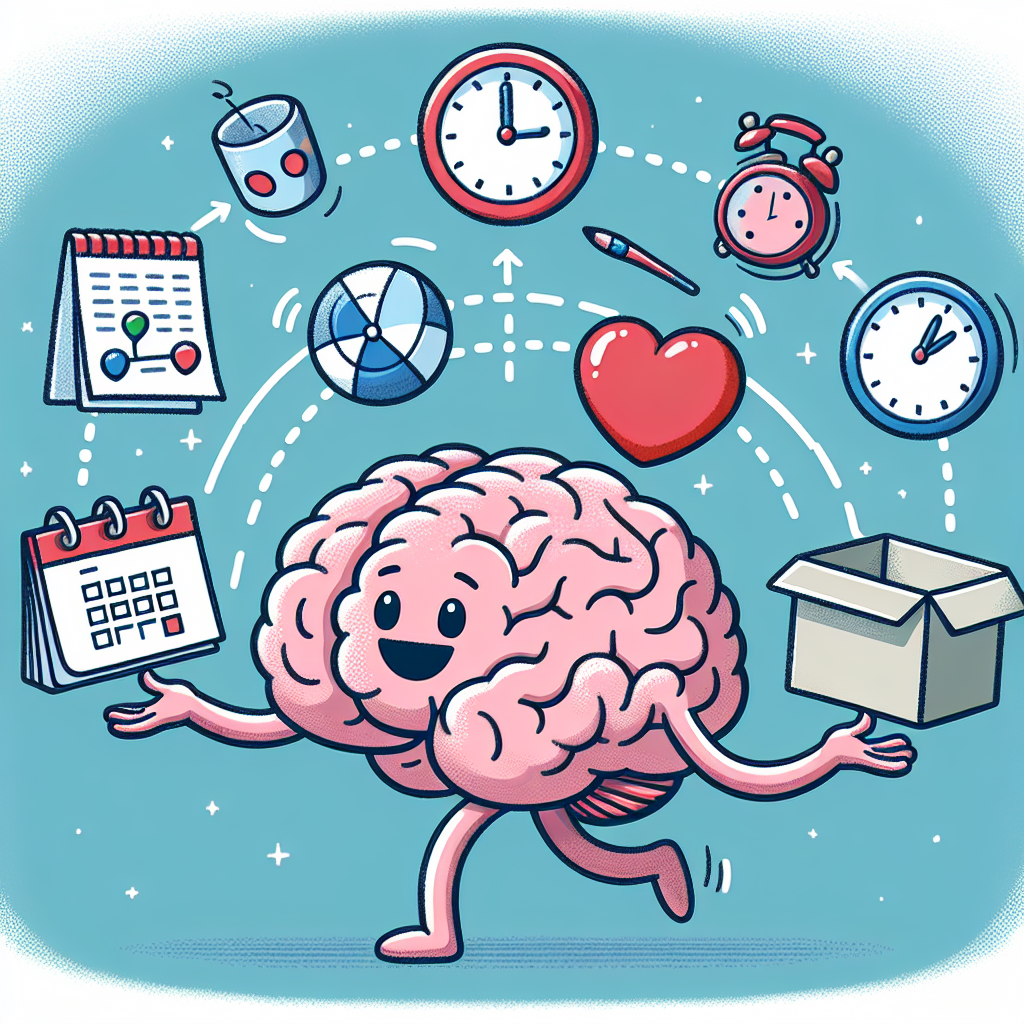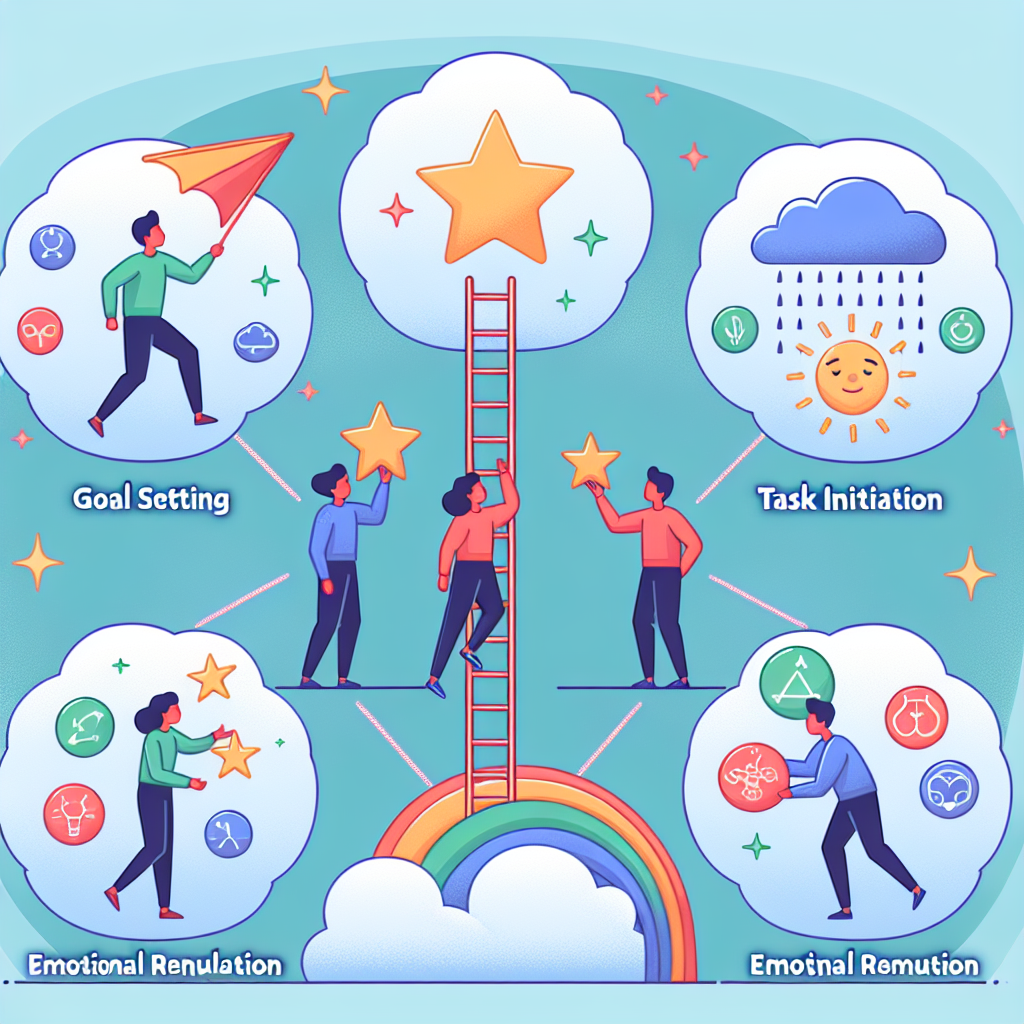
Master Your Executive Function: A Complete Guide to CBT Techniques
Introduction
Welcome to the world of cognitive behavioral therapy for executive dysfunction, where we tackle the challenges of executive function with a toolbox full of practical strategies! If you’ve ever felt like your brain is a chaotic whirlwind of thoughts, tasks, and distractions fear not! You’re not alone. Many adults, especially those navigating the complexities of ADHD, find themselves grappling with issues like poor planning, impulsivity, and difficulty in emotional regulation.
Think of executive function as your brain’s personal assistant. It’s responsible for organizing your thoughts, managing your time, and helping you stay focused. But what happens when that assistant takes an unexpected vacation? Suddenly, tasks pile up like laundry on a Sunday evening, and deadlines loom larger than life itself!
This guide is designed to help you master your executive function through effective CBT techniques. We’ll explore how cognitive behavior therapy can be a game-changer in improving executive functioning skills whether it’s through enhancing organizational skills or developing better self-monitoring strategies.
Did you know? Research shows that implementing cognitive behavioral strategies can significantly improve task initiation and emotional control in adults with ADHD!
So grab your favorite snack (because who doesn’t love snacks while learning?), and let’s dive into the fascinating world of executive function therapy. By the end of this guide, you’ll be equipped with actionable insights to manage executive dysfunction like a pro no cape required!

Understanding Executive Dysfunction
Executive dysfunction is like trying to drive a car with a faulty GPS you know where you want to go, but the directions are all jumbled. It refers to a collection of cognitive processes that help us manage our thoughts, actions, and emotions. When these processes are disrupted, it can feel like you’re navigating life without a map.
Definition of Executive Function
At its core, executive function is the brain’s command center. It involves skills such as:
- Planning and prioritization
- Task initiation and completion
- Working memory
- Emotional regulation
- Impulse control
Common Signs of Executive Dysfunction
If you find yourself frequently forgetting appointments or struggling to start projects, you might be experiencing executive dysfunction. Here are some common signs:
- Difficulties with time management
- Struggles with organization and planning tasks
- Trouble focusing on tasks or conversations
- Frequent procrastination or task avoidance
- Difficulty regulating emotions in stressful situations
Impact on Daily Life and Relationships
The effects of executive dysfunction can ripple through various aspects of life. Imagine being late for work because you couldn’t find your keys (again) or missing a deadline because planning felt overwhelming. This can lead to:
- Strained relationships: Friends and family may feel frustrated by your forgetfulness.
- Work challenges: You may struggle with meeting deadlines or collaborating effectively.
- Low self-esteem: Constantly feeling “behind” can take a toll on your confidence.

Takeaway: Recognizing the signs of executive dysfunction is the first step toward improvement. Understanding how these challenges manifest can empower you to seek effective treatment options like cognitive behavioral therapy for executive dysfunction.
If you’re nodding along right now, don’t worry! You’re not alone in this journey. Many adults face similar struggles, especially those grappling with ADHD and executive function challenges. The good news? There are practical strategies available to help manage and improve these skills!
Cognitive Behavioral Therapy for Executive Dysfunction
If you’ve ever felt like your brain is a chaotic circus, juggling flaming torches while riding a unicycle, you’re not alone! Many adults with ADHD experience executive dysfunction, which can make everyday tasks feel Herculean. This is where cognitive behavioral therapy for executive dysfunction steps in like a superhero in spandex ready to save the day!
What is Cognitive Behavioral Therapy (CBT)?
CBT is a structured, time-limited therapy that focuses on identifying and changing negative thought patterns and behaviors. Think of it as your mental gym membership where you work out your mind to build stronger thought processes and coping strategies!
How CBT Addresses Executive Dysfunction
CBT tackles the root causes of executive dysfunction by helping you:
- Identify unhelpful thoughts that sabotage your goals.
- Develop practical skills for managing time and tasks.
- Enhance emotional regulation to navigate life’s ups and downs.
- Boost self-monitoring strategies so you’re more aware of your progress.
The Role of a Therapist in CBT for Adults with ADHD
A therapist specializing in executive function therapy can guide you through this transformative process. They act like a personal trainer for your brain, providing support, accountability, and tailored strategies to help you:
- Create actionable goals: Break down big tasks into bite-sized pieces.
- Tackle procrastination: Develop methods to kickstart those daunting projects.
- Improve working memory: Use techniques to enhance retention and recall.
- Nurture flexibility: Learn to adapt plans when life throws curveballs.

CBT Techniques for Improving Executive Function
When it comes to managing executive dysfunction, cognitive behavioral therapy for executive dysfunction offers a toolbox of techniques that can help you unlock your brain’s potential. Think of CBT as your personal coach, guiding you through the maze of thoughts and behaviors that often trip you up.
Cognitive Behavioral Strategies Overview
At its core, CBT focuses on identifying and changing negative thought patterns. This is particularly useful for those grappling with ADHD and executive function challenges. Here are some key strategies:
- Self-Monitoring Strategies: Keeping track of your thoughts and behaviors is like having a GPS for your mind. It helps you identify where you’re going off course.
- Goal-Setting Strategies: Setting clear, achievable goals can turn the daunting Everest of tasks into manageable hills. Break them down into smaller steps to make progress feel tangible.
- Task Initiation Improvement Methods: Struggling to get started? Techniques like the Pomodoro Technique working in short bursts followed by breaks can kickstart your productivity engine.
- Problem-Solving Skills Enhancement: Learning structured problem-solving techniques can turn obstacles into stepping stones. Think of it as turning roadblocks into speed bumps!
The Role of Emotional Regulation
An important aspect of improving executive function is emotional regulation. After all, if you’re feeling overwhelmed or anxious, it’s tough to focus on tasks at hand. Here are some CBT techniques that can help:
- Emotional Control Techniques: These involve recognizing emotions as they arise and using strategies like deep breathing or mindfulness to manage them effectively.
- Cognitive Restructuring: This helps in reframing negative thoughts about yourself or your abilities because who needs a mental bully when you can be your own cheerleader?
Working Memory Improvement Techniques
Your working memory is like a mental notepad; if it’s cluttered, information gets lost! Here are some ways to enhance it:
- Chunking Information: Break down information into smaller chunks like slicing a pizza instead of trying to eat it whole!
- Create Visual Aids: Diagrams and mind maps can make remembering tasks easier by providing visual context.

Enhancing Organizational Skills Through CBT
If you’re feeling like your organizational skills are more of a chaotic tornado than a well-oiled machine, fear not! Cognitive Behavioral Therapy for executive dysfunction can help you harness that whirlwind into something productive. Think of it as turning your messy closet into a neat, organized space where everything has its place.
Here are some key strategies to enhance your organizational skills:
-
Organizational Skills Training for Adults with ADHD
This training focuses on practical techniques tailored to adults grappling with ADHD. It’s like having a personal trainer for your brain helping you build those essential executive functioning skills one rep at a time!
-
Planning and Prioritization Skills Development
Effective planning is crucial for improving executive function. By learning to prioritize tasks, you can tackle what’s most important first, rather than getting lost in the weeds of less critical activities. Think of it as creating a roadmap for your daily journey no more driving in circles!
-
Time Management Skills Training Through CBT
Cognitive Behavioral Therapy offers various techniques to manage time effectively. You can use tools like timers and planners to break tasks into manageable chunks. Imagine setting up a series of dominoes each task leads smoothly into the next, creating momentum rather than chaos.
Emotional Regulation and Executive Functioning Skills
Emotional regulation is like the steering wheel of your brain’s executive function vehicle. Without it, you might veer off course, especially when faced with stress or distractions. Luckily, cognitive behavioral therapy for executive dysfunction provides essential tools to help you stay on track.
Emotional Control Techniques in Cognitive Behavioral Therapy
One of the core aspects of CBT is its focus on emotional control techniques. Think of these as your emotional toolkit, ready to tackle those unexpected bumps in the road. Here are a few strategies to consider:
- Mindfulness exercises: These help you tune into your feelings without judgment, allowing for better emotional responses.
- Cognitive restructuring: This involves identifying negative thought patterns and replacing them with more balanced thoughts.
- Breathing techniques: Simple yet effective, deep breathing can ground you in moments of emotional upheaval.
Cognitive Rehabilitation Therapy for Emotional Regulation
Cognitive rehabilitation therapy (CRT) takes a more structured approach to enhancing emotional regulation. Imagine it as a fitness program for your brain targeted exercises designed to improve specific skills. Here’s how CRT can help:
- Identifying triggers: Recognizing what sparks your emotions can empower you to respond rather than react.
- Developing coping strategies: Creating personalized plans for managing overwhelming emotions ensures you’re prepared when challenges arise.
- Practicing scenarios: Role-playing difficult situations can build confidence and enhance your emotional responses in real life.
Self-Regulation Strategies in Executive Function Coaching
Self-regulation is crucial for managing executive dysfunction effectively. It’s about being the captain of your own ship navigating through turbulent waters with poise. Here are some self-regulation strategies that can make a world of difference:
- Setting clear goals: Define achievable objectives that align with your values and priorities.
- Monitoring progress: Regularly check in on how well you’re meeting those goals, adjusting as necessary.
- Rewarding yourself: Celebrate small victories to reinforce positive behavior and boost motivation!
The link between emotional regulation and executive functioning skills cannot be overstated. Strengthening these skills through cognitive behavioral therapy not only enhances daily functioning but also improves overall mental health!
In conclusion, mastering emotional regulation is essential for improving executive function. By utilizing cognitive behavioral therapy techniques, such as mindfulness, cognitive restructuring, and structured self-regulation strategies, you can navigate life’s challenges with greater ease. So why not take the first step today? Dive into CBT and watch your executive functioning skills flourish!
Coping with Impulsivity and Attention Challenges
When it comes to executive dysfunction, impulsivity and attention challenges can feel like a rollercoaster ride thrilling at times, but mostly just dizzying. Luckily, cognitive behavioral therapy for executive dysfunction offers some solid strategies to help you stay grounded.
Impulse Control Therapy Techniques
Impulse control is like having a superpower you can choose when to act and when to hold back. Here are some techniques to harness that power:
- Pause and Reflect: Before making a decision, take a moment to breathe. This simple act can help you avoid impulsive choices.
- Visual Reminders: Use sticky notes or phone alerts to remind yourself of your goals and the consequences of acting on impulse.
- Behavioral Contracts: Create agreements with yourself (or a therapist) about what behaviors are acceptable. This adds accountability!
- Mindfulness Practices: Engage in mindfulness exercises that encourage present-moment awareness, helping you recognize urges without acting on them.
Attention Deficit Disorder Treatment Strategies
Taming attention challenges is akin to training for a marathon it’s all about building endurance and resilience. Here are some strategies that can help:
- Chunking Tasks: Break larger tasks into smaller, manageable pieces. This makes it easier to focus without feeling overwhelmed.
- The Pomodoro Technique: Work in short bursts (25 minutes), followed by 5-minute breaks. It keeps your mind fresh and focused!
- Create an Organized Environment: A clutter-free space can significantly reduce distractions. Think of it as decluttering your mind too!
- Cognitive Behavioral Strategies: Implement CBT techniques specifically designed for managing attention issues, such as self-monitoring progress or using checklists.
Did you know? Research shows that combining cognitive behavioral therapy with traditional ADHD treatments significantly improves outcomes for adults struggling with executive dysfunction.
Coping with impulsivity and attention challenges isn’t just about surviving; it’s about thriving! By integrating these cognitive behavioral strategies into your daily routine, you’ll find yourself better equipped to manage executive dysfunction effectively. Remember, every small step counts towards improving executive function!
The Importance of Self-Monitoring and Flexible Thinking Exercises
- <
li >Self-Monitoring Strategies in CBT
< li >Flexible Thinking Exercises in Cognitive Behavioral Interventions
<
section >
<
h2 > Conclusion


